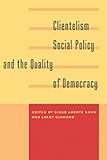Clientelism, social policy, and the quality of democracy / edited by Diego Abente Brun and Larry Diamond.
Material type: TextPublisher: Baltimore, Maryland : Johns Hopkins University Press, 2014Description: xiv, 267 pages : illustrations ; 24 cmContent type:
TextPublisher: Baltimore, Maryland : Johns Hopkins University Press, 2014Description: xiv, 267 pages : illustrations ; 24 cmContent type: - text
- unmediated
- volume
- 9781421412290 (paperback)
- 1421412292 (paperback)
- Patronage, Political -- Developing countries -- Case studies
- Democratization -- Developing countries -- Case studies
- Political sociology
- Comparative government
- Patrocinio político -- Países en desarrollo -- Estudio de casos
- Democratización -- Países en desarrollo
- Sociología política
- Gobierno comparado
- Developing countries -- Politics and government -- Case studies
- Países en desarrollo -- Política y gobierno
- 324.2/04 23
- JF 2111 C636 2014
| Item type | Current library | Home library | Collection | Shelving location | Call number | Copy number | Status | Barcode | |
|---|---|---|---|---|---|---|---|---|---|
 Libro
Libro
|
Biblioteca Juan Bosch | Biblioteca Juan Bosch | Ciencias Sociales | Ciencias Sociales (3er. Piso) | JF 2111 C636 2014 (Browse shelf(Opens below)) | 1 | Available | 00000140004 |
Browsing Biblioteca Juan Bosch shelves, Shelving location: Ciencias Sociales (3er. Piso), Collection: Ciencias Sociales Close shelf browser (Hides shelf browser)

|

|

|

|

|

|

|
||
| JF 2051 W375s 2002 Le savant et le politique / | JF2051 .W376 2006 Política y ciencia / | JF 2051 W567 2007 When parties prosper : the uses of electoral success / | JF 2111 C636 2014 Clientelism, social policy, and the quality of democracy / | JF 2112 A168d 2009 El debate de los debates : España y EE UU 2008 / | JF 2112 A168d 2012 El debate del Debate 2011: España / | JF 2112 A622g 1995 Going negative / |
Includes bibliographical references and index.
Incluye referencias bibliográficas e índice.
"What happens when vote-buying becomes a means of social policy? Although one could cynically ask this question just as easily about the United States's mature democracy, Diego Abente Brun and Larry Diamond ask this question about democracies in the developing world through an assessment of political clientelism, or what is commonly known as patronage. Studies of political clientelism, whether deployed through traditional vote-buying techniques or through the politicized use of social spending, were a priority in the 1970s, when democratization efforts around the world flourished. With the rise of the Washington Consensus and neoliberal economic policies during the late-1980s, clientelism studies were moved to the back of the scholarly agenda. Abente Brun and Diamond invited some of the best social scientists in the field to systematically explore how political clientelism works and evolves in the context of modern developing democracies, with particular reference to social policies aimed at reducing poverty. Clientelism, Social Policy, and the Quality of Democracy is balanced between a section devoted to understanding clientelism's infamous effects and history in Latin America and a section that draws out implications for other regions, specifically Africa, Southeast Asia, and Eastern and Central Europe. These rich and instructive case studies glean larger comparative lessons that can help scholars understand how countries regulate the natural sociological reflex toward clientelistic ties in their quest to build that most elusive of all political structures--a fair, efficient, and accountable state based on impersonal criteria and the rule of law.In an era when democracy is increasingly snagged on the age-old practice of patronage, students and scholars of political science, comparative politics, democratization, and international development and economics will be interested in this assessment, which calls for the study of better, more efficient, and just governance"-- Provided by publisher.
There are no comments on this title.

